|
|
||||||||||||||||
|
|
||||||||||||||||
 |
||||||||||||||||
|
|
||||||||||||||||
|
Background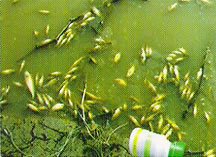 Picture 1: dead fish by pesticide use in stream
In Cambodia, awareness about the proper use of pesticide has rapidly spread in the agricultural practices, which could be the source of serious human health and environmental concerns (based on the outcome of pesticide survey in Tonle Sap Catchment), the Cambodian Center for Study and Development in Agriculture (CEDAC) has expanded the survey and educational programme to the Mekong River areas.
ObjectivesThe specific objectives of this project are: (i) to contribute to raising awareness about the a proper usage of dangerous pesticides in order to protect both the farmers’ health and also the water environment; (ii) to alert the local authorities and communities about potential dangers of the consumption of pesticides and other agro-chemicals; and (iii) to ensure that the target farmers will integrate environmental consideration into their cultivation practices; and (iv) to set up a comprehensive database on pesticides throughout Cambodia, which will inform a future advocacy campaign relating to pesticide use.
Project Activities and Outcomes 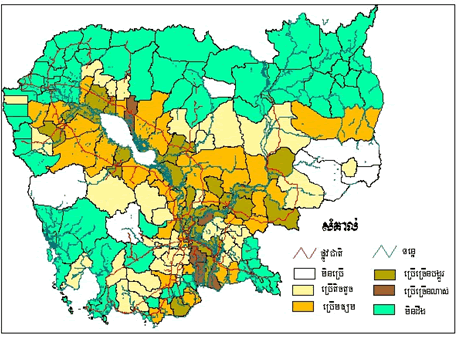 Figure 1: Map of Pesticide survey, CEDAC 2003
Research ActivityThe main activity of research was to conduct many surveys to assess the situation of pesticide consumption and its flow in the target areas. These included a pesticide markets survey, surveys to estimate a percentage of farmers using pesticides, a survey on pesticide used by farmers, and case studies on pesticide poisoning. Additionally, the case studies were conducted in farms, comparing those who had heavy use of pesticide to those who did not. The target provinces located along the Mekong River included Kandal Province, Prey Veng Province, Kampong Cham Province, and Kratie Province.
Education ActivityThe educational programme was carried out during the survey. The farmer representatives and representatives of local authorities were invited to the stakeholder workshops to discuss the results of the research and the necessary educational programme. One of the main activities of the educational programme was a farming class on the usages of pesticides and their problems and ecological agriculture. The key farmers were identified and selected for further training (one day training) towards the awareness of: (i) pesticides and their problems; (ii) ecological agriculture.  Picture 2: One day educational program of pesticide use, its causes nad effects to human and environmen
 Picture 3: Training course for representative farmers from the selected village in the Mekong catchment
Some major topics on pesticides and their problems were highlighted in the session such as: Integrated Pest Management (IPM); alternative use of pesticide; and health safety. The session about ecological agriculture focused on reflecting on farmer experiences (what is the good practice and how can their improve it?). Generally, 20 to 40 participants were invited to attend the training per village. 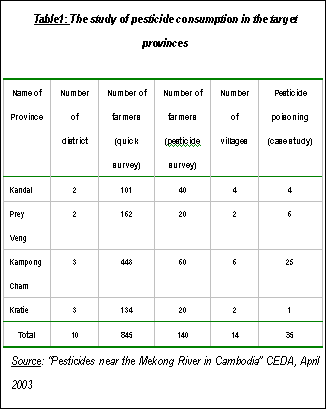 There were 458 farmers in the four target provinces who attended the training course. It was noted that only 92 women participated in the training course.
Selecting and Training key Farmers near the Mekong RiverThere were 48 farmers selected as key farmers from the villages in four target provinces. In respective target villages, the cooperating farmers selected three key farmers to take responsibility for organising pesticide monitoring and education at village level. They were trained twice a month through inter-village training. The main topics of the discussions were pesticides, economic analysis of pesticide and fertiliser use, ecological agriculture and the ideas for reduction of pesticide use in communities.
Supporting local NGOs in the target provinces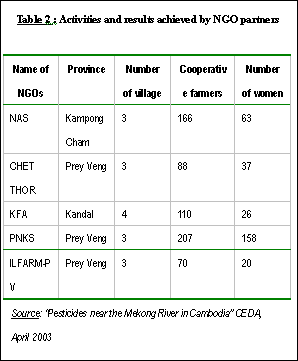 For wider dissemination of the usage of pesticides and their problems they can cause for human health and the environment, the project was implemented by the five local partners: Nak Akphivath Sahakum (NAS); Khmer Farmer Association (KFA); Ponleu Ney Kdey Sangkhim (PNKS); Chet Thor; and Improving Live-lihood of Small Farmer-Prey Veng (ILFARM-PV). The project implementers were educated in pesticides and their problems, specific methods for farmer education by seven members of staff from these NGOs. The trainees had opportunities to accompany the education team in the field to observe the methods of education. In addition, trainers were also invited from the selected NGOs.
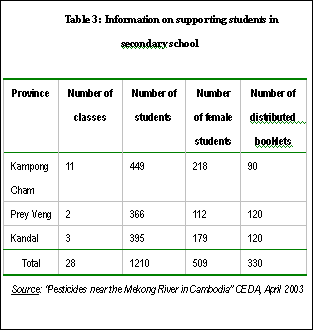 Cooperation with School TeachersThe project conducted activities to provide the education programme related to pesticide in cooperation with three secondary schools. The project also conducted capacity building for the school teachers through farmer’s education and workshops with an educational team, and the school teachers met every two months to follow up on the progress of the work. The project also provided some education materials and small amount budget for the education purpose.
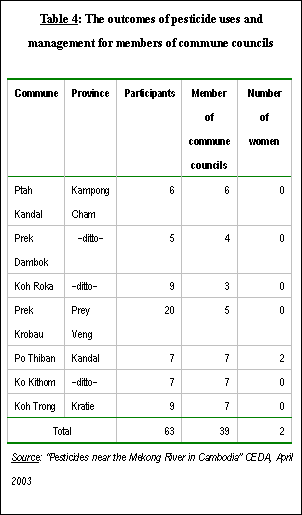 Cooperation with the Commune Councils
The project implementers supported the commune councils for protecting human health and the environmental protection. The main objectives were: (i) capacity building of commune councils for pesticides use at the local level; (ii) to increase the cooperation between local authorities and the project; and (iii) to disseminate information on pesticide issue widely in the communities. Dissemination ActivityThe reports of the pesticide use in Cambodia were produced with the data from the Tonle Sap and Mekong survey, data from community, monitoring data from other organisations. The reports will be widely disseminated to stakeholders at provincial, national and international levels.
Other project outcomesBooklets and pamphlets for awareness were distributed to farmers who did not participate in farmer class. Additionally, for wider and more effective education, the project implementers also have a close collaboration with school teachers, NGOs, Commune Councils, and especially, working with mass media.
Project EvaluationThe project implementers have concluded as follows:  Figure 2:Farmer knowledge and perception on pesticide
Source1) Pesticide on the Mekong River Banks of Cambodia?By Cambodian Center for Study and Development in Agriculture (CEDAC); April 2003
|
| pagetop |
| POLICIES | TECHNOLOGIES | NGOs & CBOs | SOURCES |
| Home | About WEPA | What's new | Activities | Definitions | Link | Sitemap | Contact Us |
|